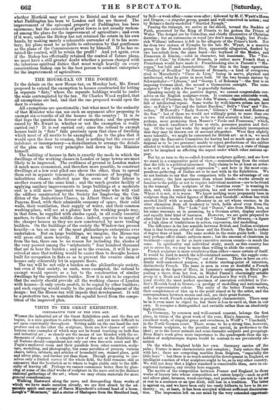THE HOUSE-TAX ON THE POOREST.
IN the debate on the new House-tax, on Monday last, Mr. Ewart proposed to extend the exemption to houses constructed for letting in separate " flats," where the separate holdings would be under the scale contemplated by the tax. Sir Charles Wood replied, that all exemptions are bad, and that the one proposed would open the door to evasion.
All exemptions are questionable ; but what must be the audacity of that Minister who can use such an argument after proposing to exempt six-sevenths of all the houses in the country ! It is he that begs the question in favour of exemption ; and the question raised by Mr. Ewart is, whether or not the exemption is really carried out ? It is not carried out; since the refusal to exempt that isuponpreciselyiu to thag bu
t clttasshethpoelfeeadxwethueallinset of which most of all merits to be exempted.
hwoould opentthe "flats" falls feva Rion,
indolence or incompetency—a disinclination to arrange the details of the plan on the very principles laid down by the Minister himself.
The building of houses in flats is exactly the mode in which the dwellings of the working classes in London or large towns are most likely to be improved. The costliness of ground in London makes it much more economical, and therefore more possible, to construet dwellings at a low rent piled one above the other, than to spread them out in separate tenements ; the convenience of keeping the industrious classes collected near the scene of their labour is another reason of the same kind ; and the much greater facility of applying sanitary imkrovements to large buildings at a moderate cost is a still more important reason. Anybody who will visit the edifices constructed by the Society for Improving the Con- dition of the Industrious Classes, in Albert Street or in the Old Pancras Road, with their admirable economy of space, their solid walls, their ventilation, their supply of water, and their common washing-place, will see at a glance how the working people may, in that form, be supplied with abodes equal, in all really essential matters, to those of the middle class ; indeed, superior to many of the cheaper houses as they are now constructed by mere trading builders. On the buildings of the society the Wind.ow-tax pressed heavily—a tax on one of the most philanthropic enterprises ever undertaken. But on large buildings, we imagine, the House-tax will press still more heavily. If any houses are to be exempt from the tax, there can be no reason for including the. abodes of the very poorest among the " aristocratic " four hundred thousand that are to bear the burden ; and as to the evasion, it will be per- ceived at once that nothing would be easier than to describe houses built for occupation in flats so as to prevent the evasive claim of houses only eolourably let in separate floors. The tax will be not only a burden on the philanthropic society, but even if that society, as such, were exempted, the refusal to exempt would operate as a bar to the construction of similar dwellings by the speculative builder. Now it is not to be expected that the society. should provide all the working classes of London with housea—it only erects models, to be copied by other builders ; and such copying would really be the practical development. of the design : but the House-tax will impede that development. It will be a protective tax, to maintain the squalid hovel front the compe- tition of the improved plan.


























 Previous page
Previous page